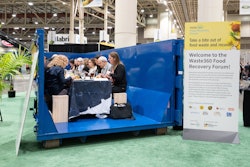
When thousands of pop culture fans storm the Jacob K. Javits Convention Center for New York Comic Con this week, they will be sharing the building with honeybees and a new indoor farm. The initiatives are one example of how convention centers are developing more sustainable food and beverage programs.
Javits launched Cultivated, a new dining and hospitality brand, in July in partnership with food service company Levy Convention Centers and New York-based caterer CxRA. Cultivated aims to provide culinary programs that incorporate locally sourced products and upcycled ingredients, new foodservice technology, and sustainability initiatives.
Cultivated’s sustainability initiatives involve a mix of low-tech and high-tech programs. At an on-site bakery, unused bread from catered meals is repurposed into new dishes such as bread pudding. Its new Farmshelf Wi-Fi-enabled indoor farm units debuted at Stop Food Waste, an event at the Javits Center on September 27 that coincided with Climate Week N.Y.C. Cultivated also has committed the venue to switching to compostable serviceware at all food and beverage locations and to end the use of plastic drinking straws.
“Whether we’re looking at new ways to harness the rooftop for fresh produce or removing straws and reducing plastic use at our restaurants and cafés, culinary and hospitality are always aligned with venue operations,” said Laura Russell, general manager of Cultivated.
Cultivated’s local partnerships include stalls from New York vendors such as Nuchas empanadas; coffee from Queens-based El Dorado Coffee Roasters served throughout the venue; and a “baked to brew” program that will re-use bread baked on site to make specialty brews in partnership with a local brewery.
 Cultivated has introduced Farmshelf, an indoor farming unit powered by Wi-Fi.Photo: Ian Zelaya/BizBash
Cultivated has introduced Farmshelf, an indoor farming unit powered by Wi-Fi.Photo: Ian Zelaya/BizBash
The brand plans to create a line of products infused with honey harvested from bee hives located on the Javits Center’s seven-acre green roof. The roof, which has reduced the convention center’s annual energy consumption by 26 percent, also will expand as part of a 1.2 million-square-foot expansion project in which Cultivated is involved.
The expanded spaces, slated to open by 2021, will include a one-acre rooftop farm overseen by Cultivated and Brooklyn Grange. The farm is expected to produce as much as 40,000 pounds of produce for the convention center’s kitchens. The working farm also will be available as an event space.
“It’s a chef’s dream to create or grow everything in house, and we are working toward growing much of our produce and herbs right here at Javits Center. Once the rooftop farm is completed, we will have ample space to grow a variety of fruit and vegetables, to provide attendees sustainable, local, and seasonal meals,” said Russell. “Additionally, the ‘whole ingredient’ approach is something we’re trying to perfect long term. We will cross utilize ingredients—for example, pickling vegetables previously used in garnishes—to ensure there is minimal waste in our operations.”
Cultivated isn’t the only hospitality program that uses a green roof. Savor Chicago, McCormick Place’s hospitality and catering program that launched in 2011, partnered with the Chicago Botanic Garden to create the Midwest’s largest farm-to-table rooftop garden. The half-acre garden yields around 8,000 pounds of produce seasonally, for convention center catering and restaurant operations including the 23rd Street Cafe & Market. Additionally, the McCormick Place garden also is home to 20,000 honey bees that produce 50 pounds of honey annually, and 2,000 Red Wiggler worms that create 200 pounds of vermicompost annually.
Savor Chicago also aims to keep food and beverage programs as local as possible. Local brewer BrickStone Brewery created the McCormick Place Everyday Ale, an ale partly brewed with Cascade Hops grown on the rooftop. The ale launched at the Chicago Auto Show and is now available throughout the greater Chicago area and northern Illinois. Additionally, 33 percent of all food purchased at McCormick Place is local, organic, or environmentally preferred, including 80 percent of seafood purchased being sustainable.
Waste reduction initiatives at McCormick Place include the Green Angels post-consumer recycling and composting program, a back-of-house waste segregation program, recycling all food grease to bio-diesel, and a cork re-harvesting program. In 2017, Savor donated 1,000 pounds of food left over from events to local charities including the Pacific Garden Mission; and more than three tons of food has been repurposed since the program launched in 2011. Since its inception, Savor has received awards including a Green Meeting Industry Council Certification, Illinois Governor’s Award for Sustainability, and the Food Recovery Challenge Award from the Environmental Protection Agency in 2018.
The San Diego Convention Center, which is celebrating its 30th anniversary this year, also is a leader in reducing food waste. The venue composted 125 tons of non-edible food in its 2018 fiscal year. The venue also composts all food scraps and doesn’t have garbage disposals in its kitchens.
Also in 2018, the convention center donated 72 tons of edible food to the San Diego Rescue Mission, which is enough to plate 115,000 meals. The San Diego Rescue Mission also shares food donations with 90 other local nonprofits. Centerplate is the convention center’s caterer.
Cultivated also is forming partnerships with local nonprofits, like one with New York Common Pantry, to cut down on food waste and support the organization's goals of reducing hunger and food insecurity.
"Sustainability really underscores everything we do," said Russell. "We’re bringing the 'waste not, want not” philosophy to another level."



















